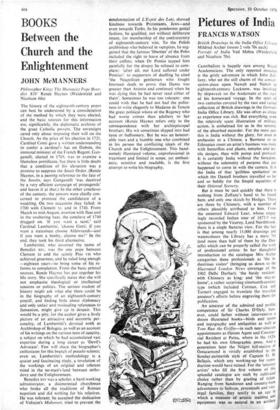BOOKS Between the Church and the Enlightenment
JOHN McMANNERS
Philosopher King: The Humanist Pope Bene- dict XIV Renee Haynes (Weidenfeld and Nicolson 60s)
The history of the eighteenth-century popes can best be understood by a consideration of the method by which they were elected, and the basic sources for this information are, significantly, the diplomatic archives of the great Catholic powers. The sovereigns cared only about imposing their will on the Church. As the price of his election in 1721, Cardinal Conti gave a written understanding to confer a cardinal's hat on Dubois, the immoral minister of the French Regent. Gan- ganelli, elected in 1769, was to exercise a blameless pontificate, but there is little doubt that a condition of his elevation was a promise to suppress the Jesuit Order. (Renee Haynes, in a passing reference to the fate of the Jesuits, says Ganganelli 'was deceived by a very efficient campaign of propaganda' and leaves it at that.) In the other conclaves of the century, the powers were chiefly con- cerned to promote the candidature of a weakling. On two occasions they failed; in 1700 with Clement xi, and in 1740. From March to mid-August, overrun with fleas and in the sweltering heat, the conclave of 1740 dragged on. 'If you want a saint,' said Cardinal Lambertini. 'choose Gotti, if you want a statesman choose Aldovrandi—and if you want a booby, choose me!' In the end, they took his third alternative.
Lambertini, who assumed the name of Benedict xiv, was the one pope between Clement xi arrd the saintly Pius vii who achieved greatness, and he ruled long enough —eighteen years—to bring some of his re- forms to completion. From the basic printed sources, Renee Haynes has put together his life story. She specifically states that she will not emphasise theological or intellectual tensions or politics. The serious student of history might ask what else there could be in the biography of an eighteenth-century pontiff, and finding little about diplomacy and only unfair and misleading references to Jansenism, might give up in despair. This would be a pity, for the author gives a lively picture of an attractive and eccentric per- sonality, of Lambertini's devoted arcs& as Archbishop of Bologna, as well as an account of his writings on the various tests of sanctity, a subject on which he had accumulated vast expertise during a long career as 'Devil's Advocate'. Few will share the biographer's enthusiasm for this branch of pseudo-science; even so, Lambertini's methodology is a quaint and fascinating study, a revelation of the workings of an original and tolerant mind in the no-man's-land between ortho- doxy and the Enlightenment.
Benedict xiv was a scholar, a hard-working administrator, a disinterested churchman who broke all the traditions of Roman nepotism and did nothing for his relatives. He was tolerant; he accepted the dedication of Voltaire's Mahomet, tried to prevent the condemnation of L'Esprit des Lois, showed kindness towards Protestants, Jews—and even towards Turks. In his ponderous genial fashion, he qualified, not without deliberate intent, for membership of the confraternity of eighteenth-century wits. To the Polish archbishop who believed in vampires, he sug- gested that the famous 'liberties' of the Poles included the right to leave of absence from their coffins; when Dr Pontio tapped him painfully for the dropsy he refused to com- plain: 'after all, our Lord suffered under Pontius': to supporters of duelling he cited 'the Neapolitan gentleman who fought fourteen duels to prove that Dante was greater than Ariosto and confessed when he was dying that he had never read either of them'. Sometimes he was too tolerant: one could wish that he had not had the polite- ness to write elegantly to Madame de Tencin the great political whore of the Regency who had worse crimes than adultery to her account (Renee Haynes refers only to the correspondence with her archiepiscopal brother). His wit sometimes slipped into bad taste or buffoonery. But he was an honour- able man and a humble one--who combined in his person the conflicting ideals of the Church and the Enlightenment. This hand- somely illustrated volume, unprofessional in treatment and limited in scope, yet enthusi- astic, sensitive and readable, is the first attempt to write his biography.






































 Previous page
Previous page